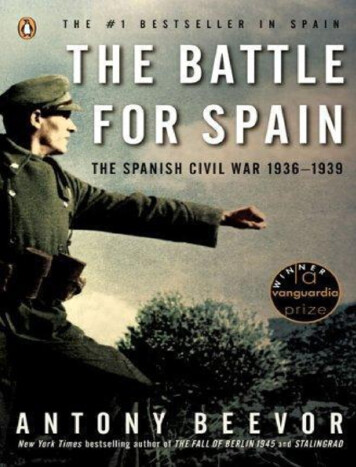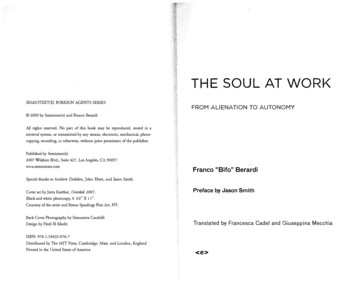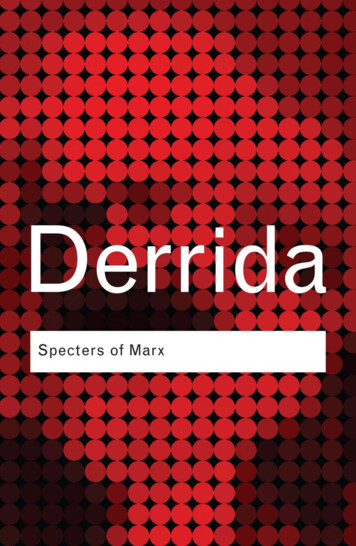
Transcription
Spect ers of Marx‘One of Derrida’s best books . . . More explicitly than before, hehas taken politics and history as his themes.’New Statesman‘Always a man of the left, [Derrida] felt able to write this bookonly when Soviet communism had collapsed, as his espousal ofMarx was then, he said, less likely to be misunderstood.’The Guardian‘Derrida presents a provocative and . . . insightful interpretationof Marx. Derrida shows convincingly that Marx is haunted byhistory and that he wants to put it to an end.’RRPE‘. . . Derrida is considered a classic of the postmodern canon.’New York Review of Books‘. . . its importance within the Derridean canon cannot be overemphasized . . . the text that scholars turn to . . . to understand thepolitics of deconstruction.’Southern Humanities Review
ct:o '\L Sr-()Qrnm()( m CI)V.q S 5 \Routledge Classics contains the very best of Routledgepublishing over the past century or so, books that have,by popular consent, become established as classics intheir field. Drawing on a fantastic heritage of innovativewriting published by Routledge and its associatedimprints, this series makes available in attractive,affordable form some of the most important works ofmodern times.For a complete list of titles visitwww.routledge.comfclassics
JacquesDerridaSpecters of MarxThe State of the Debt, the Work of Mourning andthe New InternationalTranslated from the French by Peggy KamufWith an introduction by Bernd Magnus andStephen CullenbergNew York and London
Originally published in French as Spectres de Marx, Editions Galileé, 1993First published in English in 1994by RoutledgeFirst published in Routledge Classics 2006by Routledge711 Third Avenue, New York, NY 10017Simultaneously published in the UKby Routledge2 Park Square, Milton Park, Abingdon, Oxon OX14 4RNRoutledge is an imprint of the Taylor & Francis Group, an informa businessEnglish Translation 1994 Routledge 1994 RoutledgeTypeset in Joanna by RefineCatch Limited, Bungay, SuffolkAll rights reserved. No part of this book may be reprintedor reproduced or utilized in any form or by any electronic,mechanical, or other means, now known or hereafterinvented, including photocopying and recording, or inany information storage or retrieval system, withoutpermission in writing from the publishers.Library of Congress Cataloging in Publication DataA catalog record for this book has been requestedBritish Library Cataloguing in Publication DataA catalogue record for this book is available from the British LibraryISBN10: 0–415–38957–7ISBN13: 978–0–415–38957–0
C ONTENTSEditor’s IntroductionNote on the ctions of MarxConjuring—MarxismWears and Tears (Tableau of an ageless world)In the Name of the Revolution, the DoubleBarricade (Impure “impure impure history ofghosts”)Apparition of the Inapparent: The phenomenological “conjuring trick”NotesIndex118156223247
E DITORS’ I NTRODUCTIONIn the wake of the orgy of self-congratulations which followedthe 1989 crumbling of the Berlin Wall, the subsequent dissolution of the Soviet Union, and a series of confrontationsperhaps forever to be captured best in Tiananmen Square in theimage of a single individual blocking the path of an onrushingmilitary tank, a wave of optimism engulfed the Western democratic States. This contagious optimism was best exemplified bythe confidence and popularity of Francis Fukuyama’s claim thatthe end of history was at hand, that the future—if that wordcould still be said to have the same meaning—was to becomethe global triumph of free market economies.At the same time many of us felt a vague sense of foreboding,a haunted sense that international changes of such magnitudewere as likely to result, at least initially, and perhaps for a longtime to come, in transformations as malign as they are benign.Some of us grew tired more quickly than others of the manyhasty postmortems of Marxism, as if the virtually global collapseof communism and Marxism referred to the very same thing,
viii editors’ introductionespecially in different times and places as well as to differentthinkers.And yet, it seemed to many that the collapse of communismin Eastern Europe and the Soviet Union, as well as democraticinsurgencies in China, had created a new world order. Politiciansfrom George Bush to Václav Havel had proclaimed that theideological and political alliances which structured the globalcommunity prior to 1989 must now be rethought andrestructured. Less dramatically, but just as significantly, theeconomic integration of Europe beginning in 1992, and thecontinued economic growth of Japan and the emergence ofSouth Korea, Taiwan, and Singapore as economic forces have allprofoundly changed the international economic, social, andpolitical landscapes. The meaning and consequences of thesechanges are of vital importance to us all; no discipline or sectorof culture has a monopoly on potential analyses, much less amonopoly on answers.In response to the changing social, political, philosophical,and economic dimensions of the global community, scholarsand intellectuals throughout the world are rethinking the meaning of past verities and developing new theoretical approaches.Among the central contested issues: What remains of the socialistvision(s) after the “collapse” in 1989? Has the collapse of communism also spelled the death of Marxism, and of Marx as animportant philosopher and political thinker? Have we indeedreached “the end of history” as Fukuyama has argued, wherepluralistic democracies and capitalist economies reign supreme?Is the future now to be simply a choice between Scandinavianstyle social democracy on the one hand, and unrestrained freemarket capitalism on the other? Given the difficulties somedemocratic, free market economies are experiencing—includingthe plight of the homeless, the lack of adequate health care,environmental degradation, and enormous national debtburdens—what sort of model for the future do we have? And
editors’ introductionwhat is one to make of the destructive, even violent “nationalisms” which have followed in the wake of the collapse of communism, not to mention virulent forms of ethnocentrism andxenophobia perhaps not seen since Hitler’s Germany? Whatdoes this imply, then, about the future structure and functioningof the global economy and life throughout our shared world?What new international tensions will emerge and what will bethe nature of theoretical and political discourse as we approachthe twenty-first century? Who must ask such questions and towhom must they be addressed?In particular, how will intellectuals in the Marxist traditionrespond, theoretically and politically, to the global transformations now occurring? How has the crisis in Eastern Europe andthe former Soviet Union affected the way intellectuals, scholars,and government officials in those countries and around theworld reconceive their intellectual and political projects? What isto be the status of Marxist social goals that informed so manyMarxist thinkers and social revolutionaries throughout theworld—the egalitarian distribution of income, increased workplace democracy, the end of economic exploitation and theeradication of class differences—given the current rush to various forms of capitalism in Eastern Europe, Russia, and China?Does the “end of history” also portend the end of Marxisttheory? What is living and what is dead in Marxism?In October 1991, in an environment charged by such questions, several of us began a conversation at the University ofCalifornia, at Riverside’s Center for Ideas and Society, aboutwhat it might be like to have a conference which would notconsist of yet another autopsy administered mostly by Anglophone economists and policy analysts who typically were andare very far from the sites of struggle and transformation. Wewondered how our colleagues on location, so to speak, understand their circumstances, both historically and philosophically.We decided to convene a multinational, multidisciplinaryix
xeditors’ introductionconference—“Whither Marxism? Global Crises in InternationalPerspective”—which would include distinguished thinkers andparticipants from China, Russia, Armenia, Poland, Romania,Mexico, Germany, France, the United States and elsewhere.Equally important, it seemed to us significant to provide a forumwithin which one of the most famous and influential contemporary philosophers—Jacques Derrida—could reflect on theconference’s topic, something he had not yet been able to do ina sustained and systematic way in print. We thought that such asustained reflection on Marx by Derrida would be of intrinsic aswell as historical importance.The conference itself was organized and managed by theCenter for Ideas and Society at the University of California,Riverside. It began on Thursday, April 22, 1993 with JacquesDerrida’s plenary address and ended on Saturday, April 24,1993. His plenary address was delivered in two parts, on theevenings of April 22nd and 23rd. That lecture, “Specters ofMarx: The State of the Debt, the Work of Mourning, and theNew International,” is the basis of the text now before you, atext which bears the same name; and this longer version—“augmented, clarified . . .” as Derrida says—is no less markedby that occasion, setting, and interlocutors than is the originalplenary address.It would be inappropriate, indeed, impossible, to convey insummary the many specters that haunt the texts of Marx, and,through him, of Derrida. Here we would merely wish tonote that in this text Derrida takes his position for a certain spiritof Marxism, that “deconstruction,” if there is such a thing,always already moves within a certain spirit of Marx. It shouldalso be noted that, for Derrida, in speaking of a certain spiritof Marxit is not in the first place in order to propose a scholarly, philosophical discourse. It is first of all so as not to flee from a
editors’ introductionresponsibility. More precisely, it is in order to submit foryour discussion several hypotheses on the nature of such aresponsibility. What is ours? In what way is it historical? Andwhat does it have to do with so many specters?Jacques Derrida’s Specters of Marx: The State of the Debt, the Work ofMourning, and the New International is intended to be in conversationwith and supplemented by its companion volume of conferenceessays, Whither Marxism? Global Crises in International Perspective. Thissecond volume contains selected conference essays by AshotK. Galoian, Keith Griffin and Azizur Rahman Khan, AbdulJanMohamed, Douglas Kellner, Andrei Marga, Stephen Resnickand Richard Wolff, Gayatri Chakravorty Spivak, Su Shaozhi, CarlosM. Villas, and Zhang Longxi.While some of the essays are in direct conversation with thetext of Derrida, others illustrate the force of his argument,whether they intend to do so or not. Specifically and telegraphically, at least four points of contact emerge from Derrida’s Spectersof Marx and its companion volume Whither Marxism? (1) Theproper names “Marx” and/or Marxism have always already beenplural nouns, despite their grammatical form, and despite thefact that they have been understood as if they were rigid designators; (2) “communism” (in its own pluralities) is not the sameas “Marxism”; (3) both communism and Marxism are historically sited, situated, inflected, mediated by particular traditionsand histories; (4) the proper name “Marx” is—in a certainsense—entirely uncircumventable.The purpose of these two volumes, Specters of Marx and WhitherMarxism? is to begin to address questions about the connectionbetween the death of communism and the fate of Marxism. Thevolumes raise these questions in an international and interdisciplinary context. Their goal is not simply to produce anotherpostmortem on Marxism, nor is it simply to defend Marxismagainst its critics. Rather, these volumes, each in its own way,xi
xiieditors’ introductionexplore the effects that the global crises engendered by thecollapse of communism has had on avant-garde scholars, manyof whom have lived through and often participated in thesetransitions themselves.
N OTE ON THE T EXTAt the origin of this work was a lecture given in two sessions,April 22 and 23, 1993, at the University of California, Riverside.That lecture opened an international colloquium organized byBernd Magnus and Stephen Cullenberg under the ambiguoustitle “Whither Marxism?” in which one may hear beneaththe question “Where is Marxism going?” another question: “IsMarxism dying?”Augmented, clarified, the present text nevertheless retains theargumentative structure, the rhythm, and the oral form of thelecture. Notes were added later, of course. A few new developments appear in square brackets.
D EDICATIONOne name for another, a part for the whole: the historic violence of Apartheid canalways be treated as a metonymy. In its past as well as in its present. By diversepaths (condensation, displacement, expression, or representation), one can alwaysdecipher through its singularity so many other kinds of violence going on in theworld. At once part, cause, effect, example, what is happening there translates whattakes place here, always here, wherever one is and wherever one looks, closestto home. Infinite responsibility, therefore, no rest allowed for any form of goodconscience.But one should never speak of the assassination of a man as a figure, not evenan exemplary figure in the logic of an emblem, a rhetoric of the flag or ofmartyrdom. A man’s life, as unique as his death, will always be more than aparadigm and something other than a symbol. And this is precisely what a propername should always name.And yet. And yet, keeping this in mind and having recourse to a common noun,I recall that it is a communist as such, a communist as communist, whom aPolish emigrant and his accomplices, all the assassins of Chris Hani, put to deatha few days ago, April 10th. The assassins themselves proclaimed that they wereout to get a communist. They were trying to interrupt negotiations and sabotage
dedicationan ongoing democratization. This popular hero of the resistance against Apartheidbecame dangerous and suddenly intolerable, it seems, at the moment in which,having decided to devote himself once again to a minority Communist Partyriddled with contradictions, he gave up important responsibilities in the ANC andperhaps any official political or even governmental role he might one day have heldin a country freed of Apartheid.Allow me to salute the memory of Chris Hani and to dedicate this lectureto him.xv
E XORDIUMSomeone, you or me, comes forward and says: I would like to learnto live finally.Finally but why?To learn to live: a strange watchword. Who would learn? Fromwhom? To teach to live, but to whom? Will we ever know? Willwe ever know how to live and first of all what “to learn to live”means? And why “finally”?By itself, out of context—but a context, always, remains open,thus fallible and insufficient—this watchword forms an almostunintelligible syntagm. Just how far can its idiom be translatedmoreover?1A magisterial locution, all the same—or for that very reason.For from the lips of a master this watch word would always saysomething about violence. It vibrates like an arrow in the courseof an irreversible and asymmetrical address, the one that goesmost often from father to son, master to disciple, or master toslave (“I’m going to teach you to live”). Such an address hestitates, therefore: between address as experience (is not learning to
exordiumlive experience itself?), address as education, and address as tamingor training [dressage].But to learn to live, to learn it from oneself and by oneself, all alone,to teach oneself to live (“I would like to learn to live finally”), isthat not impossible for a living being? Is it not what logic itselfforbids? To live, by definition, is not something one learns.Not from oneself, it is not learned from life, taught by life. Onlyfrom the other and by death. In any case from the other at theedge of life. At the internal border or the external border, it is aheterodidactics between life and death.And yet nothing is more necessary than this wisdom. It isethics itself: to learn to live—alone, from oneself, by oneself. Lifedoes not know how to live otherwise. And does one ever doanything else but learn to live, alone, from oneself, by oneself?This is, therefore, a strange commitment, both impossible andnecessary, for a living being supposed to be alive: “I would liketo learn to live.” It has no sense and cannot he just unless it comesto terms with death.2 Mine as (well as) that of the other. Betweenlife and death, then, this is indeed the place of a sententiousinjunction that always feigns to speak like the just.What follows advances like an essay in the night—into theunknown of that which must remain to come—a simpleattempt, therefore, to analyze with some consistency such anexordium: “I would like to learn to live. Finally.” Finally what.If it—learning to live—remains to be done, it can happen onlybetween life and death. Neither in life nor in death alone. Whathappens between two, and between all the “two’s” one likes, suchas between life and death, can only maintain itself with some ghost,can only talk with or about some ghost [s’entretenir de quelque fantôme].So it would be necessary to learn spirits. Even and especially if this,the spectral, is not. Even and especially if this, which is neithersubstance, nor essence, nor existence, is never present as such. The timeof the “learning to live,” a time without tutelary present, wouldamount to this, to which the exordium is leading us: to learn toxvii
xviii exordiumlive with ghosts, in the upkeep, the conversation, the company, orthe companionship, in the commerce without commerce ofghosts. To live otherwise, and better. No, not better, but morejustly. But with them. No being-with the other, no socius without thiswith that makes being-with in general more enigmatic than ever forus. And this being-with specters would also be, not only but also, apolitics of memory, of inheritance, and of generations.If I am getting ready to speak at length about ghosts, inheritance, and generations, generations of ghosts, which is to sayabout certain others who are not present, nor presently living,either to us, in us, or outside us, it is in the name of justice. Ofjustice where it is not yet, not yet there, where it is no longer, letus understand where it is no longer present, and where it willnever be, no more than the law, reducible to laws or rights.3 It isnecessary to speak of the ghost, indeed to the ghost and with it,from the moment that no ethics, no politics, whether revolutionary or not, seems possible and thinkable and just that doesnot recognize in its principle the respect for those others whoare no longer or for those others who are not yet there, presentlyliving, whether they are already dead or not yet born. Nojustice—let us not say no law and once again we are not speakinghere of laws4—seems possible or thinkable without the principleof some responsibility, beyond all living present, within that whichdisjoins the living present, before the ghosts of those who arenot yet born or who are already dead, be they victims of wars,political or other kinds of violence, nationalist, racist, colonialist,sexist, or other kinds of exterminations, victims of the oppressions of capitalist imperialism or any of the forms of totalitarianism. Without this non-contemporaneity with itself of the living present,without that which secretly unhinges it, without this responsibility and this respect for justice concerning those who are notthere, of those who are no longer or who are not yet present andliving, what sense would there be to ask the question “where?”“where tomorrow?” “whither?”
exordiumThis question arrives, if it arrives, it questions with regard towhat will come in the future-to-come.5 Turned toward thefuture, going toward it, it also comes from it, it proceeds from[provient de] the future. It must therefore exceed any presence aspresence to itself. At least it has to make this presence possibleonly on the basis of the movement of some disjointing, disjunction, or disproportion: in the inadequation to self. Now, if thisquestion, from the moment it comes to us, can clearly comeonly from the future (whither? where will we go tomorrow?where, for example, is Marxism going? where are we going withit?), what stands in front of it must also precede it like its origin:before it. Even if the future is its provenance, it must be, like anyprovenance, absolutely and irreversibly past. “Experience” of thepast as to come, the one and the other absolutely absolute,beyond all modification of any present whatever. If it is possibleand if one must take it seriously, the possibility of the question,which is perhaps no longer a question and which we are callinghere justice, must carry beyond present life, life as my life or ourlife. In general. For it will be the same thing for the “my life” or“our life” tomorrow,” that is, for the life of others, as it wasyesterday for other others: beyond therefore the living present in general.To be just: beyond the living present in general—and beyondits simple negative reversal. A spectral moment, a moment thatno longer belongs to time, if one understands by this word thelinking of modalized presents (past present, actual present:“now,” future present). We are questioning in this instant, weare asking ourselves about this instant that is not docile to time,at least to what we call time. Furtive and untimely, the apparitionof the specter does not belong to that time, it does not give time,not that one: “Enter the ghost, exit the ghost, re-enter the ghost”(Hamlet).This resembles an axiom, more precisely an axiom concerningaxiomatics itself, namely, concerning some supposedly undemonstrable obvious fact with regard to whatever has worth, value,xix
xxexordiumquality (axia). And even and especially dignity (for example man asexample of a finite and reasonable being), that unconditional dignity (Würdigkeit) that Kant placed higher, precisely [justement],than any economy, any compared or comparable value, any market price (Marktpreis). This axiom may be shocking to some. Andone does not have to wait for the objection: To whom, finally,would an obligation of justice ever entail a commitment, onewill say, and even be it beyond law and beyond the norm, towhom and to what if not to the life of a living being? Is thereever justice, commitment of justice, or responsibility in generalwhich has to answer for itself (for the living self) before anything other, in the last resort, than the life of a living being,whether one means by that natural life or the life of the spirit?Indeed. The objection seems irrefutable. But the irrefutable itselfsupposes that this justice carries life beyond present life or itsactual being-there, its empirical or ontological actuality: nottoward death but toward a living-on [sur-vie], namely, a trace ofwhich life and death would themselves be but traces and tracesof traces, a survival whose possibility in advance comes to disjoin or dis-adjust the identity to itself of the living present aswell as of any effectivity. There is then some spirit. Spirits. And onemust reckon with them. One cannot not have to, one must notnot be able to reckon with them, which are more than one: themore than one/no more one [le plus d’un].
The time is out of joint.—Hamlet
1INJUNCTIONS OF MARXHamlet: . . . Sweare.Ghost [beneath]: Sweare.[They swear]Hamlet: Rest, rest perturbed Spirit! So Gentlemen,With all my loue I doe commend me to you;And what so poore a man as Hamlet isDoe t’expresse his loue and friending to you,God willing, shall not lacke: Let us goe in together,And still your fingers on your lippes, I pray.The time is out of ioynt: Oh cursed spight,That ever I was borne to set it right.Nay, come, let’s goe together. [Exeunt]—Act I, scene VMaintaining now the specters of Marx. (But maintaining now[maintenant] without conjuncture. A disjointed or disadjustednow, “out of joint,” a disajointed now that always risks maintaining nothing together in the assured conjunction of somecontext whose border would still be determinable.)The specters of Marx. Why this plural? Would there be more
2specters of marxthan one of them? Plus d’un [More than one/No more one]: thiscan mean a crowd, if not masses, the horde, or society, or elsesome population of ghosts with or without a people, somecommunity with or without a leader—but also the less than one ofpure and simple dispersion. Without any possible gatheringtogether. Then, if the specter is always animated by a spirit, onewonders who would dare to speak of a spirit of Marx, or moreserious still, of a spirit of Marxism. Not only in order to predict afuture for them today, but to appeal even to their multiplicity, ormore serious still, to their heterogeneity.More than a year ago, I had chosen to name the “specters”by their name starting with the title of this opening lecture.“Specters of Marx,” the common noun and the proper namehad thus been printed, they were already on the poster when,very recently, I reread The Manifesto of the Communist Party. Iconfess it to my shame: I had not done so for decades—andthat must tell one something. I knew very well there was aghost waiting there, and from the opening, from the raising ofthe curtain. Now, of course, I have just discovered, in truth Ihave just remembered what must have been haunting mymemory: the first noun of the Manifesto, and this time in the singular, is “specter”: “A specter is haunting Europe—the specter ofcommunism.”Exordium or incipit: this first noun opens, then, the first sceneof the first act: “Ein Gespenst geht um in Europa—das Gespenstdes Kommunismus.” As in Hamlet, the Prince of a rotten State,everything begins by the apparition of a specter. More preciselyby the waiting for this apparition. The anticipation is at onceimpatient, anxious, and fascinated: this, the thing (“this thing”)will end up coming. The revenant is going to come.1 It won’t belong. But how long it is taking. Still more precisely, everythingbegins in the imminence of a re-apparition, but a reapparition ofthe specter as apparition for the first time in the play. The spirit of thefather is going to come back and will soon say to him “I am thy
injunctions of marxFathers Spirit” (I, iv), but here, at the beginning of the play, hecomes back, so to speak, for the first time. It is a first, the firsttime on stage.[First suggestion: haunting2 is historical, to be sure, but it isnot dated, it is never docilely given a date in the chain of presents,day after day, according to the instituted order of a calendar.Untimely, it does not come to, it does not happen to, it doesnot befall, one day, Europe, as if the latter, at a certain momentof its history, had begun to suffer from a certain evil, to letitself be inhabited in its inside, that is, haunted by a foreign guest.Not that that guest is any less a stranger for having always occupied the domesticity of Europe. But there was no inside, therewas nothing inside before it. The ghostly would displace itselflike the movement of this history. Haunting would mark thevery existence of Europe. It would open the space and therelation to self of what is called by this name, at least sincethe Middle Ages. The experience of the specter, that is howMarx, along with Engels, will have also thought, described, ordiagnosed a certain dramaturgy of modern Europe, notablythat of its great unifying projects. One would even have tosay that he represented it or staged it. In the shadow of a filialmemory, Shakespeare will have often inspired this Marxian theatricalization. Later, closer to us but according to the samegenealogy, in the nocturnal noise of its concatenation, the rumbling sound of ghosts chained to ghosts, another descendantwould be Valéry. Shakespeare qui genuit Marx qui genuit Valéry (and afew others).But what goes on between these generations? An omission, astrange lapsus. Da, then fort, exit Marx. In “La crise de l’esprit”(“The Crisis of Spirit,” 1919: “As for us, civilizations, we knownow we are mortal . . .”), the name of Marx appears just once.It inscribes itself, here is the name of a skull to come intoHamlet’s hands:3
4specters of marxNow, on an immense terrace of Elsinore, which stretches fromBasel to Cologne, that touches on the sands of Nieuport, thelowlands of the Somme, the chalky earth of Champagne, thegranite earth of Alsace—the European Hamlet looks at thousands of specters. But he is an intellectual Hamlet. He meditates on the life and death of truths. His ghosts are all theobjects of our controversies; his remorse is all the titles of ourglory. . . . If he seizes a skull, it is an illustrious skull—“Whosewas it?”—This one was Lionardo. . . . And this other skull isthat of Leibniz who dreamed of universal peace. And thisone was Kant qui genuit Hegel, qui genuit Marx, qui genuit. . . .Hamlet does not know what to do with all these skulls. But if heabandons them! . . . Will he cease to be himself?3Later, in “La politique de l’esprit,” Valéry has just defined manand politics. Man: “an attempt to create what I will venture tocall the spirit of spirit.”4 As for politics, it always “implies some ideaof man.” At this point, Valéry quotes himself. He reproduces thepage of “the European Hamlet,” the one we have just cited.Curiously, with the errant but infallible assurance of a sleepwalker, he then omits from it only one sentence, just one, withouteven signalling the omission by an ellipsis: the one that namesMarx, in the very skull of Kant (“And this one was Kant quigenuit Hegel, qui genuit Marx, qui genuit . . .”).5 Why this omission, theonly one? The name of Marx has disappeared. Where did itgo? Exeunt Ghost and Marx, Shakespeare might ha
style social democracy on the one hand, and unrestrained free market capitalism on the other? Given the difficulties some democratic, free market economies are experiencing —including the plight of the homeless, the lack of adequate health care, environmental degradation, and enormous national debt
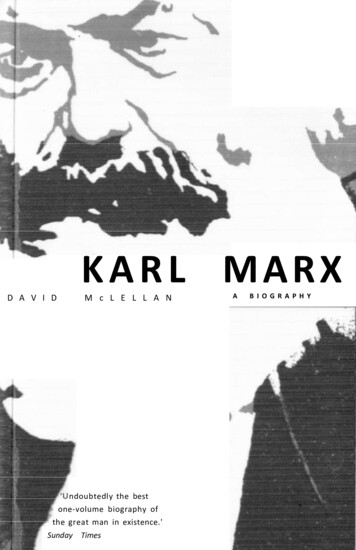
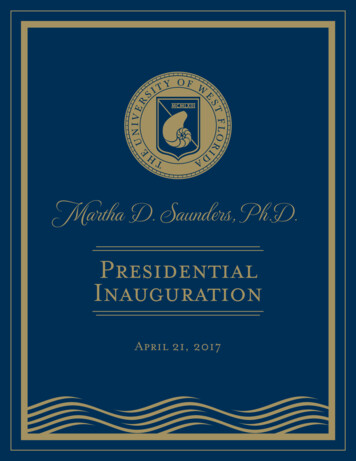
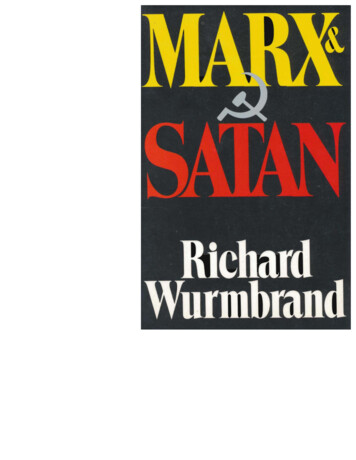
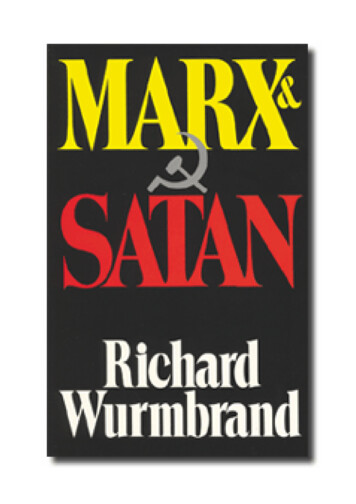
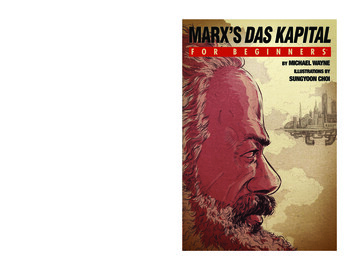
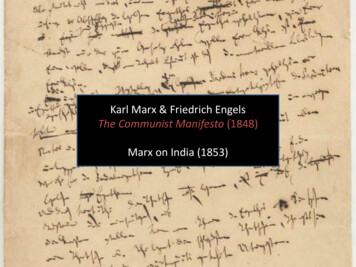
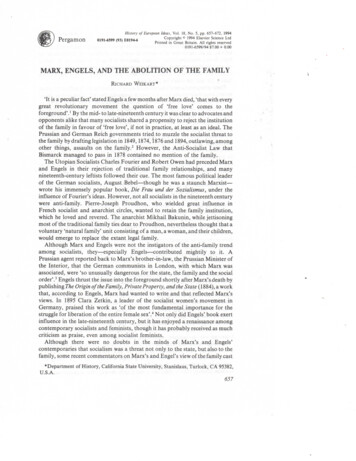
![The History of the DAV - Help Me, I'm a Disabled Veteran. [PDF]](/img/27/davhistory-davww.jpg)
